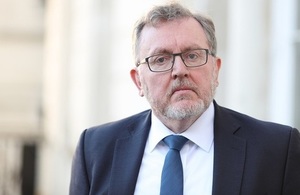UK Government reaction to GERS
Scottish Government figures show that at more than £13 billion, Scotland’s deficit at 7.9% as a share of GDP is four times that of the UK’s 1.9% as a whole.

Commenting on the Scottish Government’s GERS figures, Scottish Secretary David Mundell said:
These Scottish Government figures show that at more than £13 billion, Scotland’s deficit at 7.9% as a share of GDP is four times that of the UK’s 1.9% as a whole. This is concerning.
However these figures also confirm that being part of a strong United Kingdom – the 5th largest economy in the world – is worth nearly £1,900 for every single person in Scotland, which supports vital public services. Simply put, Scotland contributed eight per cent of UK tax, and received more than nine per cent of UK spending for the benefit of families across the country.
The UK Government is investing directly in Scotland, including more than £1 billion in city and growth deals, and we are ready to work with the Scottish Government to boost the economy.
Key points
-
Using the Scottish Government’s own data, public spending in Scotland was nearly £1,600 per head higher than that of the UK average. In other words, in 2017-18 it was 13.2% higher than the UK average. Over the last five years, this gap has been between 10.6% in 2014-15 and 13.2% in the latest full financial year.
-
Scotland’s tax contributions, at £11,052, continue to be around £300 per head less than the UK average, at £11,358.
-
Scotland’s deficit [or borrowing] was nearly £1,900 per person larger than the UK average in 2017-18.
-
Scotland contributed 8.0% of UK tax and received 9.3% of UK spending in 2017-18 (Scotland’s population share was 8.2% in mid-2017), demonstrating how Scotland receives secure and stable levels of spending irrespective of the volatile tax revenues from the North Sea.
-
Scotland’s share of UK total revenue has fallen over recent years. Since its peak at 9.7% in 2008-09, Scotland’s contribution to UK revenues has been on a downward trend in subsequent years and is currently at 8.0% of the UK total.
-
Scotland’s geographical share of North Sea revenues increased from £266 million in 2016-17 to £1.3 billion in 2017/18. This is up from a low of £50 million in 2015-16 and down from a peak in 2008-09 of £8.9 billion.
-
Non-North Sea revenue in Scotland grew by 3.6% in 2017-18 compared to 2016-17, just marginally higher than the figure for the UK as a whole, at 3.5% (excluding reclassification of English housing association). This growth is driven by increased national insurance contributions and corporate tax revenues.
-
Scotland’s net fiscal balance as a share of GDP was -7.9%, compared to -1.9% for the UK overall. This decreased from -8.9% in 2016-17, compared to the UK overall, which came down from -2.3%. In absolute terms, Scotland’s deficit was £13.4 billion in 2017-18, down from £14.5 billion in 2016-17.
-
While Scotland’s overall fiscal position improved in 2017-18, Scotland’s deficit as a share of its economy is over 4 times higher than that of the UK.